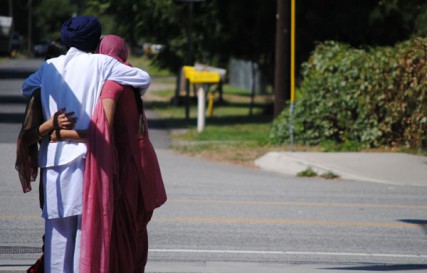
U.S. Sikhs are taking heart in a widely publicized Senate hearing on hate crimes and a pledge by the Justice Department to consider tracking hate crimes directed at their community.
The hearing, on Wednesday (Sept. 19), featured Harpreet Singh Saini,18, whose mother was one of six Sikh worshippers killed Aug. 5 when a gunman opened fire in their Wisconsin temple.
“Senators, I came here today to ask the government to give my mother the dignity of being a statistic,” he told a subcommittee of the Senate Judiciary Committee. “My mother and those shot that day will not even count on a federal form. We cannot solve a problem we refuse to recognize.”
Sikhism, a monotheistic faith founded in South Asia, is the world’s fifth largest religion with an estimated 200,000 to 500,000 adherents in the U.S. Male Sikhs often keep their uncut hair bound up in a turban.
The Senate hearing, spurred by the Wisconsin shooting, brought more than 400 people to Capitol Hill, most of them Sikhs.
Geeta Goindi, a Sikh woman who attended the hearing, said she was buoyed by the turnout.
“The biggest success was the strength in numbers,” said Goindi, one of many Sikhs who expressed hope that Americans will now take note of their faith community.
In Congress and in the administration, Sikh activists have gained supporters.
Sen. Dick Durbin, D-Ill., who chaired the hearing, said Americans must learn from the Wisconsin shooting. “It was not the first tragedy based on hate and, sadly, it won’t be the last. But it should cause all of us to redouble our efforts to combat the threat of domestic terrorism.”
Scott McAllister, a deputy undersecretary in the Homeland Security Department, testified that his department will remain vigilant when it comes to domestic terrorists but pointed out some of the difficulties in tracking them. “(T)hey tend to operate as lone offenders or in small cells, which complicates law enforcement's detection and disruption,” he said.
Sikhs asked government officials to protect their community, saying they are often targets of discrimination from those who do not understand their beliefs and practices.
The Sikh Coalition, a civil rights organization, like Saini, is asking Congress to track hate crimes against Sikhs. Deputy Assistant Attorney General Roy L. Austin Jr. said that the Justice Department would convene a meeting of religious groups in October to consider expanding hate crime tracking statistics to include Sikhs.
The Sikh Coalition also wants government officials and candidates to take a pledge to abstain from using language that incites bigotry, to invest in anti-bullying campaigns and to create a presidential task force to track progress on hate crime prevention.
Sikh activists were supported by 150 organizations — from the Council on American-Islamic Relations to the American Jewish Committee — that signed a letter calling for the hearing.
After the hearing, more than 100 civic groups sent a letter to President Obama calling for a summit on religious tolerance.
“Mr. President, your leadership and high-level attention has never been more urgently needed to bring comfort to those who have been victims of this hate and to set a course forward for our country where children will not be judged by how they pray but by the content of their character,” the letter reads.






